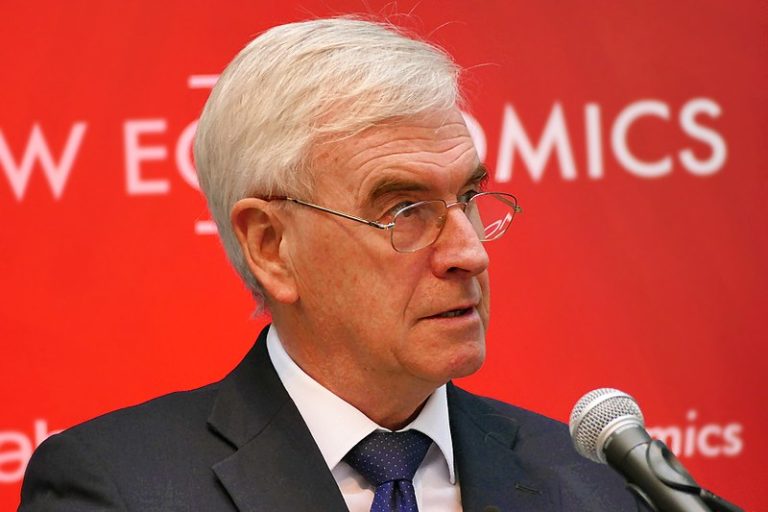There’s been even more furore than usual surrounding today’s upcoming Budget. Prime Minister Theresa May’s recent promise to ‘end austerity’ has set the wheels in motion in political and media circles, and there is no end to the speculation on what this could mean and how exactly the Conservative Government could do this.
Nobody is better placed to comment on the current state of play than Shadow Chancellor John McDonnell, whose pre-Budget speech I was lucky enough to attend last Thursday. A critic of Conservative economic policy for many decades before taking up the mantle of Shadow Chancellor, McDonnell has used his position to provide viable alternatives to the Conservative programme of austerity; shifting the Labour Party further from the centre ground it occupied pre-2015.
Introduced by Shadow Business, Energy and Industrial Strategy Secretary Rebecca Long-Bailey, McDonnell began by outlining the financial hardship that the programme of austerity implemented over the last eight years has led to. With £19 billion needed to stop cuts to departmental budgets alone, McDonnell highlighted the failure of austerity to meet its objectives. Beginning by using the illustrative example of productivity growth being at its worst since the end of the Napoleonic wars, he set about opposing the arguments for austerity before outlining Labour’s demands for the next Budget.
Firstly, McDonnell set about some of what he views as the rapidly declining internal politics within the Conservative party. Labour being able to force concessions on the rollout of Universal Credit is something he put down to the current weakness of the relationship between Theresa May and Philip Hammond. Continuing in this vein, McDonnell speculated that Theresa May’s inability to satisfy her backbenchers on the matters of both Brexit and austerity led to Hammond having the ability to undermine her – her austerity announcement, in this scenario, is seen as May throwing the gauntlet down in retaliation.
The Tories, McDonnell announced, had pledged to eliminate the deficit by 2015, yet debt has doubled since 2011, with the UK now £1.8 trillion in debt. Debt has also been disproportionately shifted onto households, with low income families shouldering increased amounts. So, he asked – the programme of austerity has been shown to fail in this respect: why has it been allowed to carry on?
Another overarching theme of McDonnell’s pre-Budget speech was the effect that austerity economics have had on the UK’s productivity. Cuts to investment have meant that we are lagging behind in terms of benefitting from the technological revolution in workplaces. Our output per hour stands at 15% lower than the rest of the G7 member states, and has caused immense wage stagnation. This stagnation also has a geographical bent – our wage distribution by region is also the most unequal in the Northern Europe, with London and the surrounding areas accounting for an incredibly disproportionate amount of wage growth.
The last thread that McDonnell extrapolated on was what he argued to be the unacceptable human cost of austerity. He cited a recent report by the Resolution Foundation that claimed ending austerity by 2022-23 would require £31 billion in additional spending, highlighting the extent of the current cuts, before noting that there are four million more children are in poverty since 2010, set to increase to five million if Universal Credit is rolled out as planned. 123,000 children are currently in temporary accommodation – a 65% increase since 2010. The number of children in care is at the highest level since 1985 due to cuts to early intervention services, and spending on youth centres has been cut by 65% as a result of slashes to Local Authority budgets. More than 400,000 people can no longer access social care, and Age UK has linked excess winter deaths to immense strain on the NHS, with NHS Trusts ending last year with a £960 million deficit.
In response to this, McDonnell then set about setting out demands from the Labour Party to be included in today’s Budget. The first of these is an overhaul of the taxation system to provide investment in underfunded public services. The second is an investment programme, to grow the economy through measures such as a National Investment Bank. Taking into account the failure of Britain to harness the power of the fourth Industrial Revolution so far, he emphasised the role of the state in adopting an industrial strategy that prioritises innovation whilst being mindful of its effects on the environment. And finally, ensuring fair wages, trade union rights, placing workers on boards and spreading ownership of wealth and prosperity.
It’s yet to be seen how Hammond decides to shape the narrative of austerity, and to what extent he defends it in today’s Budget. He may assent that yes, the voting public have austerity fatigue. He also may challenge McDonnell’s narrative of austerity, set out above. However, with the arguments against austerity coming thick and fast from many corners of society and industry, it will be interesting to see how the Chancellor decides to play it.




